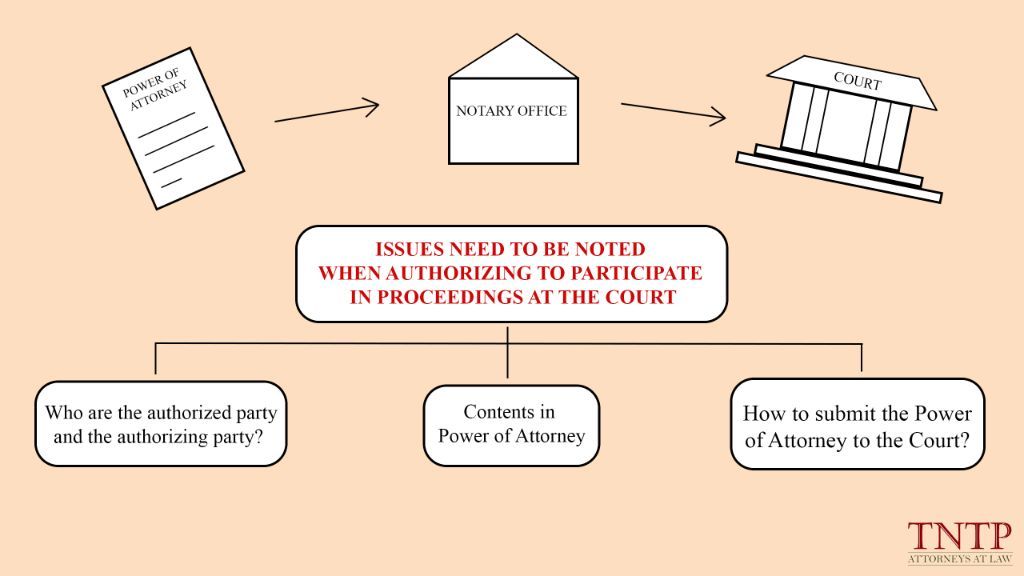Issues need to be noted when authorizing to participate in proceedings at the court

In the process of settling disputes at the Court, it is becoming more and more common when the litigant authorizes another individual or organization to participate in proceedings. The authorized representative will represent the litigant and protect the legal rights and interests of the authorizing party.
Authorization brings many benefits to litigants when they can request the Court to protect their legal rights and interests but do not spend much time and effort to contact and work with the Court; they can, through their authorized representatives, participate in mediations as well as court sessions. However, what issues litigants should note so that the authorization is performed legally and approved by the Court? The following article will point out the things that litigants need to pay attention to.
1. Who are the authorized party and the authorizing party?
In the process of litigation at the Court, it needs to be understood that the authorizing party is the litigant. Therefore, the authorizing party may be an individual or a legal entity. Pursuant to Clause 1 Article 85 of the 2015 Civil Procedure Code, the authorized party (authorized representative) can be an individual or a legal entity. Determining the authorizing party and the authorized party will lead to two following cases:
- At least one party is a legal entity: In this case, the parties do not need to notarize the power of attorney at a notary office.
- Both of authorizing party and authorized party are individuals: In this case, the parties must notarize the power of attorney at the notary office.
Although the Law of Notarization 2014 and the Civil Code 2015 do not regulate “Power of Attorney” but only regulate “Authorization Contract”, as well as there is no regulation for notarization of power of attorney at the notary office, however, according to the experience of lawyers when participating in litigation, in case the parties in the authorization relationship are individuals, the Court will require the parties to notarize their power of attorney at the notary office, then the power of attorney is considered a legal document. Meanwhile, in the case at least one party is a legal entity, the Court does not require notarization. Therefore, when the parties prepare to proceed with the authorization, this issue should be noted.
2. Contents in Power of Attorney
The Power of Attorney must contain the main following contents: Information of the authorizing Party and the authorized Party, Content of authorization, Scope of authorization, Period of authorization. In addition, because the power of attorney is a unilateral document made by the authorizing party, it is unlike the authorization contract which is an agreement between the parties. Therefore, the power of attorney only needs the signature of the authorizing party but does not need the signature of the authorized party.
In case the authorizing parties and the authorized parties are both individuals and must notarize the power of attorney at a notary office, normally the notary will request to make a Power of Attorney according to the form of the notary office. However, the content of the power of attorney will be drafted by the notary based on the will of the parties, so the parties still need to note the content of the authorization’s scope and authorization’s period to avoid occurring risks and disputes about authorization relationships in the future.
3. How to submit the Power of Attorney to the Court?
Besides the issue of the notarization of the power of attorney, in order that the authorization recognized by the Court, the litigants must note that the original Power of Attorney must be submitted to the Court, it is not accepted if the litigant submits a certified copy or copy. Therefore, the number of Power of Attorney should be made enough so that the authorizing party and the authorized party keep 01 origin each party after submitting to the Court.
There are the legal shares of TNTP about issues that need to be noted when authorizing to participate in proceedings at the Court. Hope this article is useful to you.
Best regards.
You may need Dispute settlement: Psychological battle or Legal battle
Join Fanpage Dispute Settlement And Debt Collection to have more useful legal knowledge.
TNTP & Associates International Law Firm
Lawyer Nguyen Thanh Ha
Email: ha.nguyen@tntplaw.com


